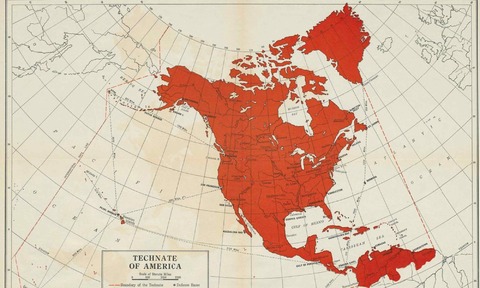Let the scientists rule
8 Apr 2025

Donald Trump’s expansionist plans are just a retread of century-old dreams of a continent run by technocrats says Brian J Ford. Guess whose ancestor was to blame for that idea?
We all think it: why leave the governmental decisions to parliament? Let the scientists have a go. Democracy is all very well but just look at whom we elect. Let’s hand it over to a group of technocrats.
Two things: first. It has been done before. When the Greek economy collapsed, the EU imposed rule by a group of technocrats – scholars who understood these things. Their interim Prime Minister was Lucas Papademos, a graduate in physics with a higher degree in electrical engineering. His cabinet included unelected scholars but every cabinet member was a graduate and all but one held a postgraduate qualification.
Secondly, rule by scientists is not a new idea. It underpinned the Technocracy Movement 100 years ago. At its height, it proposed that the USA acquire the whole of North America, Greenland, and down past Panama. Sounds familiar? This is what President Trump has been advocating in his recent speeches.
He proclaims that it must be done to protect national security, ensure economic dominance, and free up natural resources. Those ideas mirror the principles of the Technocracy Movement, which once captivated Joshua Haldeman, a Canadian chiropractor and technocrat. He was Elon Musk’s grandfather.
The Technocracy Movement peaked in the 1930s, advocating a society that abandoned elected politicians, in favour of scientists and engineers. Haldeman believed in what he called the North American Technate — a borderless, rationally managed superstate spanning the continent.
President Trump argues that the USA and Canada are already so intertwined they should formalize the relationship. Canada’s vast resources — oil, timber, electricity and water — could be optimized under a unified administration run with American scientific efficiency.
The Technocracy Movement [advocated] a society that abandoned elected politicians, in favour of scientists and engineers
Greenland, sparsely populated and strategically located, is next. Mr Trump’s real-life interest in purchasing Greenland from Denmark was dismissed as a joke, but he frames it as a matter of national defence and resource exploitation, with Greenland’s rare earth minerals fuelling a tech-driven economy. He sees a self-sustaining Arctic technopolis where engineers and scientists, not politicians, oversee mining operations.
Panama rounds out the trio. Mr Trump wants the Panama canal, proposing a modernized system run by a consortium from the USA. No more reliance on a small nation’s government; the canal becomes a technocratic marvel, its tolls and operations fine-tuned for maximum profit and efficiency. He says that Americans built the canal, omitting that it was tens of thousands of Asian, Chinese and Black labourers who died doing the work, along with about 350 Americans who lost their lives while supervising.
The second canal is never mentioned. I saw it being built; a larger set of locks to take bigger vessels. They opened in 2016 and were largely financed by the Japanese Bank for International Cooperation and the European Investment Bank. It could also be that Mr Trump wants to regain control of the Trump Ocean Club in Panama, which he lost in 2013 (owing huge sums in unpaid tax).
When Mr Trump took to Truth Social, X, and Fox News, touting the idea of a vast new empire, it was greeted as audacious. But it wasn’t new at all. Technocracy Inc was active 100 years ago, and Elon Musk’s grandfather laid the groundwork. The idea of an American Technate would have a single scientific authority that governed the whole of North America. The organisation became tainted by allegations of Nazi sympathies, so Canada closed it down and banned its publications. Yet the movement still exists; it has a dormant website at technocracyinc.org – and the idea of rule by scientists still endures.
Does technocracy work? The Greek technocrats did secure the much-needed second financial bailout, but they didn’t halt economic decline. President Trump has never referred to the American Technate, though he’s advocating the idea. Meanwhile, Elon Musk may not yet be ruling the United States, an idea that his grandfather foresaw, but surely he’s getting close.
PIC: (Creative Commons) Howard Scott, variously described as a visionary and a layabout, published this proposal for the American Technate in 1940. Those who follow current American politics may be forgiven for experiencing déjà vu …

